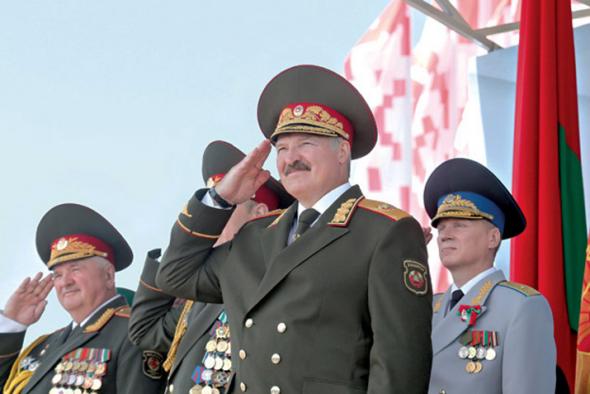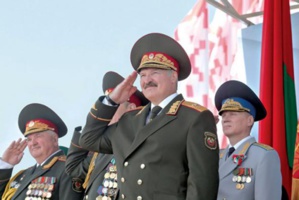Yet while Belarus stayed in the profound stop, its general surroundings flipped around. A year ago's insurgency in Ukraine and Russia's forceful response to it have clattered nerves in Minsk and roused a halfway vital reconsider. Mr Lukashenko, a long-serving if untrustworthy associate of Vladimir Putin, censured Russia's extension of Crimea and did not go along with its ban on EU rural fares. Having facilitated two rounds of peace talks in Minsk, he now encourages America to get included in Ukraine and has even offered the administrations of Belarusian peacekeepers.
Mr Lukashenko, a czar of the most established school, has not abruptly changed his spots. He is playing the same old amusement: adjusting one monster neighbor (the EU) against the other (Russia). In fact, a second lesson he has drawn from Ukraine's disaster cuts against the first: tread painstakingly to abstain from inciting the bear. Alongside Armenia and Kazakhstan, Belarus has joined Russia's Eurasian Economic Union, which bills itself as an opponent to the EU (in spite of the fact that authorities in Minsk minimize Mr Putin's aspiration for a coin union). Belarus' summon economy stays above water on the back of inconceivable vitality appropriations from Russia, and surveys demonstrate that Belarusians lean toward joining with Russia over Europe.
Yet the new air of insecurity has given Mr Lukashenko space for move. Not at all like past preelection periods, he has not felt obliged to force financial or fiscal levers to pump the economy. Restriction competitors have renounced dissent. With the district on fire, the security of Mr Lukashenko looks a superior wager than an obscure newcomer.
The economy, in the mean time, contends for a movement. Seen from Minsk, the previous 20 years were not all that awful (for the individuals who kept their noses out of legislative issues). Of the six nations in the EU's Eastern Partnership (EaP) program, Belarus has the most noteworthy wage every individual bar oil-rich Azerbaijan (a nastier totalitarianism). It evaded the clamorous privatizations of Russia and Ukraine, and has no oligarchs straddling business and legislative issues. Everyday defilement is insignificant, open administrations for the most part work, and unemployment is low, regardless of the fact that the authority figures are kneaded. Belarus is the main EaP nation that has no regional question with its neighbors.
Yet Belarus' financial model is squeaking, and the inconveniences of its Russian benefactor worsen its troubles. A year ago the tumbling Russian rouble constrained Belarus to debase its own particular coin and force capital controls. Recently Belarus approached the Kremlin for a $2.5 billion credit, however got just $110m. Genuine wages are falling, and laborers in state-possessed firms have been compelled to take necessary unpaid occasions. Following 20 years of seclusion, authorities understand they require European counsel and cash.
Enter Brussels
Little and ailing in regular assets, Belarus was dependably a simple spot for the West to lead a qualities based remote approach. The EU labeled Mr Lukashenko "Europe's last tyrant" and set its trusts in the resistance (the administration's repulsiveness made option systems difficult to safeguard). However now authorities recognize that the strategy of scorn basically drove Belarus closer to Russia. Also, Mr Putin's adventurism in Ukraine has upped the ante. As Mr Lukashenko wryly called attention to a week ago in a swipe at Mr Putin, "there are despots a touch more awful than me, no?"
The EU, including hardline individuals like Britain and the Netherlands, is presently reevaluating its approach. It won't relinquish its calls for popular government, or its solidarity with the Belarusian resistance. Yet it is considering a scope of approaches to work with Mr Lukashenko's administration, from accelerating its visa-application procedure to backing for Belarus' enrollment of the World Trade Organization. An EaP summit in Riga one month from now will be observed nearly for indications of a defrost, especially if Mr Lukashenko is permitted to go to. However that would oblige him to free the modest bunch of staying political detainees, and he reasons for alarm giving the impression of bowing to weight. Greater changes, say authorities in Brussels, will need to hold up until after the presidential decision.
It could all end in tears. Some trepidation a rehash of the mortification of 2010, when the EU's last endeavor at a rapprochement with Mr Lukashenko passed on in the post-decision crackdown. Anyway Europeans are a more wary bundle nowadays. As opposed to sit tight futile for their equitable sample to rouse Belarus, they accept they have recognized normal hobbies with the administration and will work to satisfy them. More than anything, Mr Lukashenko is urgent to protect Belarus' unstable autonomy and, on account of Mr Putin, Europe looks better set to help him.
References:
http://www.economist.com/news/europe/21648038-russias-antics-ukraine-are-upending-politics-elsewhere-belarus-and-great-bear?zid=307&ah=5e80419d1bc9821ebe173f4f0f060a07
Mr Lukashenko, a czar of the most established school, has not abruptly changed his spots. He is playing the same old amusement: adjusting one monster neighbor (the EU) against the other (Russia). In fact, a second lesson he has drawn from Ukraine's disaster cuts against the first: tread painstakingly to abstain from inciting the bear. Alongside Armenia and Kazakhstan, Belarus has joined Russia's Eurasian Economic Union, which bills itself as an opponent to the EU (in spite of the fact that authorities in Minsk minimize Mr Putin's aspiration for a coin union). Belarus' summon economy stays above water on the back of inconceivable vitality appropriations from Russia, and surveys demonstrate that Belarusians lean toward joining with Russia over Europe.
Yet the new air of insecurity has given Mr Lukashenko space for move. Not at all like past preelection periods, he has not felt obliged to force financial or fiscal levers to pump the economy. Restriction competitors have renounced dissent. With the district on fire, the security of Mr Lukashenko looks a superior wager than an obscure newcomer.
The economy, in the mean time, contends for a movement. Seen from Minsk, the previous 20 years were not all that awful (for the individuals who kept their noses out of legislative issues). Of the six nations in the EU's Eastern Partnership (EaP) program, Belarus has the most noteworthy wage every individual bar oil-rich Azerbaijan (a nastier totalitarianism). It evaded the clamorous privatizations of Russia and Ukraine, and has no oligarchs straddling business and legislative issues. Everyday defilement is insignificant, open administrations for the most part work, and unemployment is low, regardless of the fact that the authority figures are kneaded. Belarus is the main EaP nation that has no regional question with its neighbors.
Yet Belarus' financial model is squeaking, and the inconveniences of its Russian benefactor worsen its troubles. A year ago the tumbling Russian rouble constrained Belarus to debase its own particular coin and force capital controls. Recently Belarus approached the Kremlin for a $2.5 billion credit, however got just $110m. Genuine wages are falling, and laborers in state-possessed firms have been compelled to take necessary unpaid occasions. Following 20 years of seclusion, authorities understand they require European counsel and cash.
Enter Brussels
Little and ailing in regular assets, Belarus was dependably a simple spot for the West to lead a qualities based remote approach. The EU labeled Mr Lukashenko "Europe's last tyrant" and set its trusts in the resistance (the administration's repulsiveness made option systems difficult to safeguard). However now authorities recognize that the strategy of scorn basically drove Belarus closer to Russia. Also, Mr Putin's adventurism in Ukraine has upped the ante. As Mr Lukashenko wryly called attention to a week ago in a swipe at Mr Putin, "there are despots a touch more awful than me, no?"
The EU, including hardline individuals like Britain and the Netherlands, is presently reevaluating its approach. It won't relinquish its calls for popular government, or its solidarity with the Belarusian resistance. Yet it is considering a scope of approaches to work with Mr Lukashenko's administration, from accelerating its visa-application procedure to backing for Belarus' enrollment of the World Trade Organization. An EaP summit in Riga one month from now will be observed nearly for indications of a defrost, especially if Mr Lukashenko is permitted to go to. However that would oblige him to free the modest bunch of staying political detainees, and he reasons for alarm giving the impression of bowing to weight. Greater changes, say authorities in Brussels, will need to hold up until after the presidential decision.
It could all end in tears. Some trepidation a rehash of the mortification of 2010, when the EU's last endeavor at a rapprochement with Mr Lukashenko passed on in the post-decision crackdown. Anyway Europeans are a more wary bundle nowadays. As opposed to sit tight futile for their equitable sample to rouse Belarus, they accept they have recognized normal hobbies with the administration and will work to satisfy them. More than anything, Mr Lukashenko is urgent to protect Belarus' unstable autonomy and, on account of Mr Putin, Europe looks better set to help him.
References:
http://www.economist.com/news/europe/21648038-russias-antics-ukraine-are-upending-politics-elsewhere-belarus-and-great-bear?zid=307&ah=5e80419d1bc9821ebe173f4f0f060a07


 The Politics Between Russia And Belarus
The Politics Between Russia And Belarus





 Companies
Companies